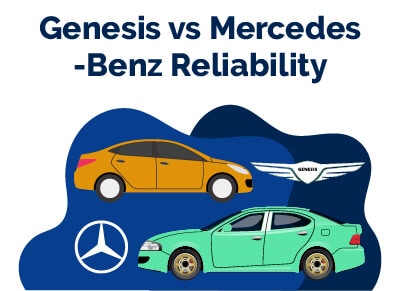Genesis vs Mercedes: Which Is More Reliable?
June 18, 2023


Chris is Head of Content for FindTheBestCarPrice and is based out of Philadelphia, PA. As a seasoned automotive industry analyst and car enthusiast, he ensures the highest level of quality across all our content and curates our picks for the best deals each month.
Chris studied information systems and marketing at Drexel University and writes about a wide range of topics ranging from car buying tips to troubleshooting common mechanical issues.
When he’s not thinking about cars, he likes to stay in with his dog and make an “attempt” to finish a crossword puzzle (he’s not quite at the Saturday/Sunday level…yet). As a former cheesemonger, Chris still has a “sharp” passion for all things cheese, and his fridge is always loaded with it!
Chris also has a passion for things that go fast, and drones are no exception. He spends some of his time writing for Dronesourced.
In 2008, the Hyundai Genesis debuted and quickly became a strong contender in the luxury full-size car market. However, in 2017, Genesis became a separate entity and rebranded the vehicle as the G80.
The rebranding of the vehicle as the G80 demonstrated the company's commitment to advancing the frontiers of design and engineering. In 1902, Emil Jellinek, an automobile entrepreneur from Austria, trademarked "Mercedes" in tribute to his daughter, Mercedes Jellinek.
The Hyundai Genesis garnered a commendable reliability rating of 3.5 on a scale of 5.0, securing its place as the seventh-most dependable among its full-size luxury counterparts.
On the other hand, the Mercedes-Benz marque obtains a modest rating of 3.0 out of 5.0, ranking it at a somewhat lackluster 27th position amidst the vast array of 32 car brands.
Despite this, Mercedes-Benz is renowned for its automotive safety innovations. This article will comprehensively analyze the various categories of Genesis vs. Mercedes reliability to assist potential buyers in making informed decisions.
Table of Contents
- Genesis vs. Mercedes Reliability: Detailed Comparison
- Which Is the Best Car: Genesis or Mercedes?
- 1. Genesis vs. Mercedes Reliability: Design
- 2. Genesis vs. Mercedes Reliability: Repair and Maintenance Cost
- 3. Genesis vs. Mercedes Reliability: Durability
- 4. Genesis vs. Mercedes Reliability: Engine
- 5. Genesis vs. Mercedes Reliability: Gas Mileage
- 6. Genesis vs. Mercedes Reliability: Technology
- 7. Genesis vs. Mercedes Reliability: Safety
- Final Verdict
- Best Car Deals by Category
Genesis vs. Mercedes Reliability: Detailed Comparison
| Features | Genesis | Mercedes |
| Design | ||
| Repairs and maintenance cost | ||
| Durability | ||
| Engine | ||
| Gas mileage | ||
| Technology | ||
| Safety |
Which Is the Best Car: Genesis or Mercedes?
Although both marques have etched their names in the chronicles of automotive history, designating an unequivocal victor remains a formidable feat.
The Hyundai Genesis, now renamed the G80, has entrenched itself as a potent force in full-size luxury cars ever since its inception in 2008.
The brand's steadfast dedication to extending the frontiers of design and engineering is conspicuously manifested in its aptitude for attaining an admirable reliability rating, which positions it in a commendable seventh place amongst its contemporaries.
In contrast, Mercedes-Benz is a brand of unparalleled repute whose legendary status speaks for itself. The marque's legacy of innovation and engineering excellence dates back to the very roots of modern automobiles.
From the invention of the first gasoline-powered car to the latest models of luxury vehicles, Mercedes-Benz has been at the forefront of the industry.
Despite having a modest reliability rating, the brand is widely recognized for its outstanding safety innovations.
However, the best car brand is subjective and largely depends on individual preferences and priorities. While some might prefer Genesis's stylish designs and advanced features, others might lean towards the timeless elegance and sophisticated engineering of Mercedes-Benz.
1. Genesis vs. Mercedes Reliability: Design
Genesis places a premium on a well-proportioned aesthetic by incorporating elongated Two-Line rear combination lamps that flawlessly blend with the trunk and the Genesis lettering emblem.
The Parabolic Line configuration further heightens the sophisticated and voluminous form of the automobile, while the Athletic Power Lines unveil its potency and dynamism.
The DLOs and C-pillars foster an expansive environment for backseat passengers while ensuring privacy. The Genesis wheel design is graceful yet substantial, augmenting the car's regal countenance.
In contrast, Mercedes-Benz designers are formulating upcoming automobiles harmoniously, reconciling traditional and contemporary aspects.
The brand is steadfastly committed to "sensual purity" as the defining feature of modern luxury, which lies at the core of its philosophy.
Presently, luxury is equivalent to a timeless character transcending fleeting fashion trends. Genuine luxury is a scarce commodity, and hence, it is highly coveted.
Mercedes-Benz represents modern luxury because people gradually become less fixated on material worth and ownership.
There is an increasing emphasis on genuine, authentic experiences that evoke emotions, a reduction to the essentials, high-tech fused with traditional craftsmanship, and authentic pleasure.
Through their design, the Mercedes-Benz designers engineer emotionally charged experiences and gratifying elements of surprise.
Their creations are in harmony with the dichotomy of the Mercedes-Benz brand, which embodies the fusion of contrasts and propels stimulating juxtapositions.
The sculptural, three-dimensional design is executed via precise, comprehensible contours and sensual sculpted surfaces.
Winner: Genesis
2. Genesis vs. Mercedes Reliability: Repair and Maintenance Cost
A Hyundai Genesis is a relatively affordable vehicle with an annual upkeep expense of $565, which is considered reasonable.
However, Mercedes-Benz's maintenance costs exceed the industry average, requiring drivers to set aside a budget of $600 to $1,200 per year for repairs and upkeep.
Winner: Genesis
3. Genesis vs. Mercedes Reliability: Durability
The Hyundai Genesis is widely acclaimed for its remarkable endurance, exhibiting a typical longevity that ranges between 180,000 and 200,000 miles, as indicated by the odometer.
It is crucial to acknowledge that these parameters are not inherently fixed and can be swayed by the caliber of vehicle upkeep, as demonstrated by instances in which particular models have far surpassed the 200,000-mile benchmark.
Conversely, Mercedes-Benz automobiles can persist for 15 to 17 years under proper preservation and maintenance, flaunting an average dependability rating of 3.0 out of 5.0 grounded on customer evaluations.
The Mercedes fleet, characterized by a blend of speed, power, sophistication, and elegance, commands a formidable presence in the luxury automobile sector.
Winner: Mercedes
4. Genesis vs. Mercedes Reliability: Engine
The Genesis 5.0 R-Spec variant is powered by the cutting-edge Tau V8 engine, generating an astonishing 429 horsepower at 6,400 rpm and an impressive peak torque of 376 lb. ft. at 5,000 rpm.
For adrenaline junkies, the 3.3L Turbo Gasoline Engine is an outstanding option, boasting a mid-phase air intake CVVT system, twin-turbo engine, integrated exhaust head, and electronic thermostat to offer an exhilarating ride.
In contrast, the Mercedes-Benz S 400 d is furnished with the most formidable diesel engine to date from Mercedes-Benz, proficient in generating 250 kW (340 hp) and 700 Nm of torque (with a combined fuel consumption of 5.2 l/100 km and combined CO2 emissions of 135 g/km).
Moreover, the recently innovated Mercedes-AMG 2.0-litre M 139 engine has the potential to produce up to 310 kW (421 hp), thus rendering it the most potent turbocharged four-cylinder engine in serial production globally.
Winner: Genesis
5. Genesis vs. Mercedes Reliability: Gas Mileage
The 2021 Genesis G80 commands the throne for the most fuel-efficient Genesis model, with an impressive 32 miles per gallon achieved on the highway. Close on its heels is the 2021 Genesis G70, clocking in at up to 30 miles per gallon on the highway.
In contrast, while Mercedes-Benz vehicles are renowned for their spirited performance, lavish accouterments, and high-end features, their fuel-efficient models often fly under the radar.
However, the 2022 Mercedes-Benz CLA Coupe reigns supreme with an impressive 36 miles per gallon on the highway, while the 2022 Mercedes-Benz A-Class Sedan and GLA SUV offer 35 and 34 highway miles per gallon, respectively.
Finally, the 2022 Mercedes-Benz GLB SUV acquits itself with 32 highway miles per gallon.
Winner: Mercedes
6. Genesis vs. Mercedes Reliability: Technology
Genesis provides cutting-edge features that aim to improve the driving experience. The BUILT-IN CAM function enables drivers to remotely keep track of the vehicle's surroundings and status using a smartphone app.
The Genesis Digital Key app enables drivers to easily share key access with their friends and family and operate the car remotely via touch.
The wireless smartphone charging system has an alert function that warns drivers if they forget their phone inside the vehicle.
Moreover, the Lexicon 15-speaker system with Quantum Logic Surround technology delivers high-quality sound with clear projection, rich bass, and an immersive listening experience.
In contrast, Mercedes-Benz offers its Mbrace system, which offers drivers the first six months free and enables them to connect to their vehicle from their smartphone or computer.
This system allows drivers to stay connected on the road using a range of apps right in the car.
Additionally, the Mercedes-Benz COMAND system offers a central controller and a 7-inch display that brings audio, available navigation, and more to drivers' fingertips. Bluetooth audio streaming and a USB input are standard features.
Winner: Genesis
7. Genesis vs. Mercedes Reliability: Safety
Genesis offers a variety of cutting-edge safety features, such as Lane Keep Assist, which helps prevent unintended lane departure, and Smart Cruise Control with Stop/Start, which maintains a safe distance from the car in front.
Furthermore, Blind Spot Detection with Rear Cross-Traffic Alert warns drivers of potential obstacles during lane changes and approaching vehicles from the rear.
In comparison, Mercedes-Benz has dedicated significant resources to developing groundbreaking safety technologies that safeguard drivers and passengers, with the aspiration that they will never have to use them.
These Mercedes-Benz benchmarks continue to be followed by the rest of the automotive industry.
Mercedes-Benz Intelligent Drive employs a versatile camera furnished with 6D Vision technology and a spectrum of sensors to surveil the adjacent milieu of the vehicle, invariably poised to effectuate evasive maneuvers and safeguard all individuals on the thoroughfare.
Adaptive braking technology ensures a safe stop, with predictive brake priming anticipating sudden stops, and automatic brake drying removes water from brake discs in rainy conditions.
Winner: Mercedes
Final Verdict
The reliability competition between Genesis and Mercedes is closely contested, with Genesis edging ahead by a narrow margin.
While both brands have excelled in several categories, Genesis has ultimately emerged as the majority victor.
Best Car Deals by Category
Posted in Car Buying Tips, Car Troubleshooting |




